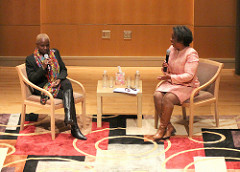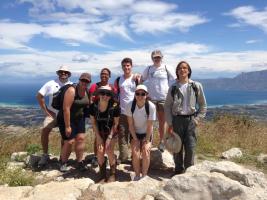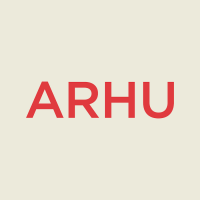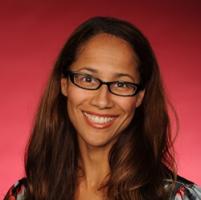The College of Arts and Humanities
Office of Marketing and Communications
September 23, 2014
REMARKS BY DEAN THORNTON DILL TO ARHU FACULTY, STAFF AND STUDENTS
Gildenhorn Recital Hall, Clarice Smith Center
State of the College Address
Introduction| Advancing our Common Purpose| Building Community| Finances | Diversity & Inclusion| Conclusion
3:40 p.m.
Introduction
THE DEAN: Each fall, it is my privilege to provide an update on our accomplishments, announce new initiatives and share my perspective on the overall well-being of the college. Let me begin by saying, the state of the college is strong. Your vitality, creativity and sheer brilliance continue to chart new paths and gain national and international recognition. Your resourcefulness helps us find innovative ways to address our challenges. The college is strong because of you.
Today, I assess our progress in relationship to the goals I outlined when I took this position three years ago. They are: advancing our common purpose, building community and promoting diversity and inclusion. I will also highlight a few of the many accomplishments featured in the forthcoming 2013-14 Year in Review.
Advancing our Common Purpose
In some ways, advancing our common purpose is a grand challenge for the arts and humanities in a period when society conceptualizes grand challenges as broad issues in search of scientific and technological solutions. We know that scientific discoveries and technologies that change the world are ones that capture the imagination and interests of human cultures and societies. We also know that knowledge from the arts and humanities is key to understanding the meaning, implementation, utilization, and consequences of those scientific and technological discoveries. Our responsibility is to demonstrate that knowledge to others.
I thought about this when I saw a recent television commercial for a national for-profit university. A man in a business suit walks out of the rain and enters an office building through a set of large, double doors. A second man rushes up behind him and tries to open the door, but it’s locked. The eyes and nose of a head appear through a narrow rectangular viewer near the top of the door. The man who is trying to get in says, “Hi, I came to drop off my resume.” “PASSWORD,” replies the voice of the eyes and nose. “WHAT’S THE PASSWORD?” The man shouts, “Synergy?”
In our college, “synergy” is the password. It’s the word that we use to symbolize the unique ability of the arts and humanities at Maryland to link humanistic ideas and creative traditions to modern innovation. In doing so, we provide an example for the campus and the community about the importance of the arts and humanities in addressing vexing problems confronting society and the world today.
Arts & Humanities Center for Synergy
In January 2014, we launched the website for the Arts and Humanities Center for Synergy, the physical and virtual manifestation of a long desired and much discussed Humanities Center. The purpose of ARHU Synergy is to provide a location for scholars, students, and the public to participate in multidisciplinary investigation and expression of the human condition. We do this by infusing the research and practice of the arts and humanities into new locations and areas of endeavor both inside and outside of the academy. The term “synergy” was chosen because it already resonates in disciplines across the university, referring to an interaction between two or more forces in which their combined effect is greater than the sum of their individual effects.
Under the leadership of Associate Dean Sheri Parks, ARHU Synergy has introduced programs that promote and support the collaborative and interdisciplinary initiatives within the college, across the university, and with external professional and community partners; and research and scholarship in the arts and humanities.
Collaborative initiatives of ARHU Synergy include:
- WORLDWISE: Arts and Humanities Dean’s Lecture Series, which this year features speakers on the environment, trauma and healing and innovation. Walter Isaacson, biographer of Steve Jobs and Albert Einstein, and President and CEO of the Aspen Institute will launch the series in November.
- On October 11, ARHU Synergy will lead a Think-A-Thon in College Park that will bring university administrators, city officials and residents together to envision the impact arts and culture can have on plans to reinvigorate Baltimore Avenue and revitalize the City of College Park.
- Last year we began a partnership with the American Academy of Arts and Sciences to promote a dialogue on the importance of the humanities to the future of our nation as discussed in their report and video “The Heart of the Matter.” We brought to campus commission members John Lithgow, Annette Gordon-Reed and later Stephen Kidd, director of the National Humanities Alliance. ARHU has been credited by the Academy as being one of three national leaders in advancing the conversation about this important report.
- Community engagement in scholarship and teaching has been a key mechanism for linking humanities and arts to social issues and underserved populations. Last year we launched the first year of a three-year pilot program called the Foxworth Creative Enterprise Initiative. Today, I share a short clip of the Foxworth promotional video highlighting Professor Leigh Wilson Smiley's students’ work with the Latin American Youth Center in Hyattsville. Later this week I will release the full video and you will receive an announcement for the next round of faculty applications to teach Foxworth courses.
The other major focus of ARHU Synergy—facilitating research in the college—is already having an impact. ARHU Synergy has provided workshops and training for 110 faculty on the fundamentals of grant writing, budgeting and fellowships. In fiscal year ‘14, our faculty submitted 30% more research proposals than in the previous year and more than doubled the amount of money requested. It’s too early yet to know the results of these requests, but we’re optimistic that this increased activity will yield greater reward.
One of our most celebrated accomplishments with research support was with the Department of Classics, which successfully competed to become the sole recipient of a half-million dollar grant from the National Italian American Foundation. That grant is for new research on the legacy of ancient Rome as reflected in the architecture and art of the United States’ capital and in the nation’s system of governance.
Please visit the website www.arhusynergy.umd.edu to get informed and involved. Also, be on the lookout for a forthcoming collaborative virtual workspace that will facilitate the formation of research groups around multidisciplinary topics of interest.
Arts at Maryland
Advocacy for the arts and humanities takes many forms. In late summer, the possibility of a campus partnership with the Corcoran Gallery of Art and College of Art + Design was laid to rest. I am convinced that the discussions generated on campus and in the local art community have been beneficial. First, they led to new ideas and conversations about academic programs and artistic engagements that could benefit the entire campus. Second, they have enhanced campus commitment to foundational principles about the role of the arts in our university. Among these principles are that the arts and humanities are a core component of a quality education, a gateway to cultural understanding and conflict resolution, and can enhance and refine the entrepreneurial abilities and creative talents that today’s students bring to college. In an effort to capitalize on the energy and insights generated through this process, I have been working with others to propose and develop ideas that will help President Loh achieve his vision for the arts at Maryland. Our ideas include a campus based institute for art and design innovation; a program in digital media studies; and the integration of arts and culture into the revitalization of College Park.
Undergraduate Education
We are launching two new undergraduate initiatives this year:
- First, we are collaborating with the University Career Center to house Kate Juhl, Program Director, in the college’s Office of Student Affairs four days a week. This will help us bring career advising and engagement to our students in a much more direct manner.
- Second, we are launching a first-year seminar for ARHU majors designed to empower and acclimate them as they transition into the university. It introduces them to different methods of humanistic study and explores how multiple disciplinary perspectives can be used richly and critically to understand human beings, cultures and societies. The call for proposals went out this week.
Faculty and Staff Accomplishments
Whether working in interdisciplinary partnerships, as independent scholars or supporting the work of the campus in other ways, our faculty and staff continue to garner prestigious national awards as well as important campus recognitions. While you can learn about these in greater detail on the ARHU website or in the forthcoming Year in Review, I would like to acknowledge a few of them today. National awards announced in the past year include a Guggenheim to Holly Brewer, Harvard University’s W.E.B. Dubois Medal to Ira Berlin and a Korean Government Precious Crown Medal of the Order of Cultural Merit to Robert Ramsey. Faculty members have received numerous book awards and students in or affiliated with ARHU have won a Fulbright, 12 Borens and nine Critical Language Scholarships for the current academic year.
Campus level awards that deserve special recognition are: Jeffrey Herf, Distinguished University Professor, Jonathan Auerbach Distinguished Scholar-Teacher and Linda Mabbs, the Kirwan Faculty Research and Scholarship Prize. These three colleagues will be honored at the university convocation on October 7th.
Marilee Lindemann, recently appointed executive director of College Park Scholars, received the Freedom and Liberation Medal from the President’s Commission on LGBT Issues; and Jessica Enoch, Jason Rudy and Lynn Bolles received Graduate Faculty Mentor of the Year Awards. Jessica White in the college’s Office of Student Affairs won the 2013-14 Provost Professional Academic Advisor of the Year Award, and Philosophy advisor Christopher Vogel won the 2013-14 Provost Graduate Advisor of the Year award. There are numerous other outstanding accomplishments and I invite you to join me in celebrating all of our colleagues and students who have earned special recognition.
Building Community
Faculty
Our faculty are pivotal in our efforts to advance our common purpose and you have just been introduced to our 15 newest faculty members. As you can see from their bios in the program, we continue to attract to our campus people with stellar accomplishments and exceptional promise. So, I will repeat what I said last year: “The responsibility of those of us who are seasoned members of this community is to provide the resources, intellectual climate and mentoring that will permit the talents of our new faculty to bloom and encourage them to remain rooted in University of Maryland soil.” This is one of the most important aspects in the second goal of building community.
Staff
We also seek to build community by supporting staff through the formation of a staff council. That council is now in its second year of operation and it has been officially incorporated into the College Plan of Organization. Its chair, Claire Goebler from SLLC, sits on the Collegiate Council. This year the staff council is planning a variety of events including helping staff with the annual review (PRD) process, professional development, healthy workplace activities and community service.
Finances
Community and shared governance are particularly important in times of fiscal volatility and it is perhaps stating the obvious to say that public colleges and universities today are operating in a fiscally challenging environment. “At the campus level,” to quote from an American Association of State Colleges and Universities Policy Brief, “tough decisions involving institutional spending, resource reallocation and mission-sustaining investments are the new norm.”
Salary compression has been an important concern that has had a corrosive effect on faculty and staff morale. Over the last two years, we have found ways to begin to address this issue through strategic use of the merit pool. This has been a collaboration between individual units and the Office of the Dean and it is one that we will strive to continue.
Nevertheless, resource issues deriving from a structural deficit at the campus level continue to result in budget cuts. It is also now clear that some proposed faculty and staff hires must be reconsidered. The move to the Big 10 heightens awareness of our funding limitations as compared with our peers, yet it also provides a springboard for rethinking resource allocation to promote strategic growth in the future. Both President Loh and Provost Rankin have expressed their full commitment to this rethinking as a means to support excellence at College Park.
Diversity & Inclusion
Diversity Plan
College priorities and actions for diversity and inclusion are described in the Diversity Task Force Report and College Implementation Plan, distributed in fall 2013. When you review it—which I hope you will do regularly—please note that we affirm that work on diversity and inclusion takes place in our classrooms, hiring and promotions, scholarship, and community engagement. As we commit ourselves to fairness and equity, we embrace the unique position of arts and humanities disciplines in advancing scholarship, creativity, and teaching about identity and difference.
New Faculty Hires
This fall, I take special note of seven hires across the fields of LGBT, African American, and US Latino/a studies. These hires diversify the faculty and bring diversity and inclusive scholarship to the core curriculum across the college, with notable gains in American Studies, English, History, the School of Languages, Literatures, and Cultures, and Women’s Studies. Moreover, our 100% success in promotion and tenure cases this past year moves the college faculty closer to gender parity in the tenured ranks, simultaneously advancing expertise in fields led by women scholars.
Advance
Finally, the participation of ARHU faculty in the National Science Foundation (NSF)—funded ADVANCE program has helped women and faculty of color build support networks among peers and mentors, receive seed grants for collaborative research, and has extended the sensibilities of work-life balance and the rights of family and medical leave to all faculty, including those in the professional tracks. I commend Laura Rosenthal, who will serve as ADVANCE professor for a second year. She will continue the important work she has begun in engaging full professors as mentors for associate and assistant professors.
Conclusion
This afternoon I’ve presented only a snippet of the dynamic activities of the college. I hope it helps you understand why I conclude that the state of the college is strong, even in the face of societal and financial challenges; why I am optimistic about our future; and why I consider it a privilege, honor, and a joy to serve as chief advocate and executive officer for University of Maryland’s College of Arts and Humanities.
Thank you for your attention.
Thanks to the staff who have worked so hard to plan this event and insure that it runs smoothly—the entire staff of the dean’s office makes everything I discuss possible every day. I particularly want to acknowledge Brian for the video, Nicky for all of her work in telling our story, Chanel for being a rock even when it gets crazy and Veronica for being a Rockette.
Now I have one final slide and remark.
Let’s party! (Lionel Richie “All Night Long” plays in background. Applause.)
END
5:35 p.m.













